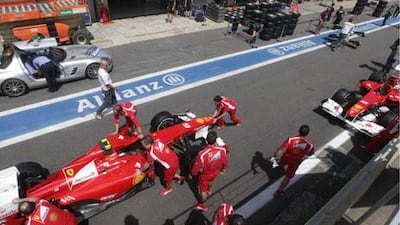Sao Paulo // Interlagos, celebrating 40 years since it first hosted the Brazilian Grand Prix, appears destined for a major overhaul that will see the entire pit lane shifted to the opposite side of the circuit from 2013 and one of the sport's most famous paddocks relegated to support race status.
Claudia Ito, the managing director of the Sao Paulo circuit, said the planned redevelopments will see the pit lane - one of the longest on the F1 calendar - moved, with new garages, hospitality facilities and media centre incorporated into the project that will be situated on the track's second straight.
"The municipality, who is the owner of the circuit, have an idea to build a new pit lane and garages and everything," Ito said.
"They will move the entire pit lane area to the straight on the other side of the circuit: new entrance, new exit, new buildings."
Circuit officials have been looking at ways to improve safety at Interlagos - which opened in 1940 and changed its name 45 years later to the Autodromo Jose Carlos Pace - since the death of two drivers earlier this year in stock car accidents.
Charlie Whiting, the race director for the FIA, the world governing body for motorsports, has visited the country on a number of occasions since Paulo Kunze and Gustavo Sondermann were killed on the track in April following accidents on the start-finish straight.
Ito acknowledged the current pit entrances are "a little dangerous", but said that Whiting was satisfied.
"It is not because of safety, but more because we understand the teams need more space for their operations," Ito said, adding: "With all the modifications that have been made over the years, Mr Whiting said the circuit is very safe".
The most recent changes for this year have seen a new grandstand erected, but at no significant alteration to the track.
The next step in the redevelopment process is for Gilberto Kassab, the mayor of the city of Sao Paulo, to meet Bernie Ecclestone, Formula One's commercial rights owner.
The two men will discuss the projected plans and, if an agreement is reached, the blueprints will then be presented to the FIA. "I believe we will have everything in place by 2013," Ito said.
The paddock at Interlagos is renowned for being cramped, with teams operating out of confined facilities.
In contrast to the pit buildings at Yas Marina Circuit, where several teams had offices that were unused during race weekend, the conditions of the hospitality buildings in Sao Paulo see Sebastian Vettel, the world champion, sharing a changing room with teammate Mark Webber.
"It's a little old-school in many ways," Webber said of the Interlagos circuit. "The facilities are pretty cosy, but it's a beautiful little track."
Luiz Razia, a Brazilian driver who Friday took part in the morning free practice session with Team Lotus, said he had heard rumours of an expansion, but was not fully aware of the plans.
"It will be a good change because it is pretty tight here," he said.
"Saying that, some of the mechanics tell me it is squeezed, but they like it because it is old-style."
Ito said that because of the layout of the circuit, expansion is impossible unless wholesale renovation is undertaken.
"Here in Brazil, because we have so little space, you cannot always build out, so you have to build up," Ito said.
"By moving to the other side of the circuit, we will be able to expand out."
Webber likened the mood at Interlagos to a carnival and Ito moved quickly to quell early fears that any redevelopment would involve altering the famous yellow and green lined track or hampering the circuit's famous atmosphere.
"The track itself will be preserved in its entirety; we will just move within the area," she said.
"The old paddock will remain as a support paddock and we have no intentions of making the new one a big paddock like the modern circuits. We want to keep true to tradition.
"It will still be cosy where everyone is close, people can meet each other and it is different to the other circuits.
"This way it remains very friendly, which is one of the main reasons people like it here."
Safety off the track has also been an issue for organisers in recent years.
Jenson Button, the McLaren-Mercedes driver, was leaving the circuit last year with friends and family when the Briton's armoured vehicle was attacked by armed gunmen.
The party escaped because of evasive manoeuvres by their driver, an undercover local police officer, but Button was left shaken.
On the same evening, a group of mechanics from Sauber were robbed at gunpoint, while staff of Ecclestone's Formula One Management were also forced to hand over their belongings.
Ito said everything has been done to ensure such incidents remain a rarity this year, but he added that the 12 race teams have at no stage made any special requests for added security measures.
"The problem with security on the south side of the circuit was something we needed support with," she said.
"The municipality and the police have given us their full support, so we hopefully don't have this situation again, but one-off incidents are not surprising for a city of the size of Sao Paulo."
There was little police presence at the exit to the circuit on Thursday evening, yet Button has not changed his routine other than to ride with a police escort.
Webber said he drives to the track alone, while Vettel said the situation is no worse than anywhere else.
"Surely you don't want something like what happened to Jenson to happen, but you don't need to be in Brazil or Sao Paulo for something like that to happen," Vettel said.
"It could happen to you anywhere around the world, so there is no need to be overly concerned; nothing's changed."

